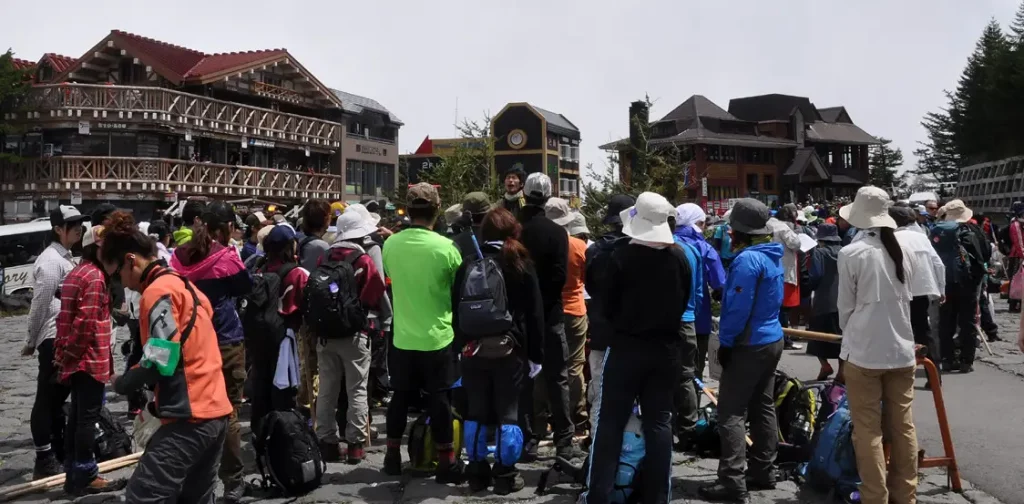Halting Overtourism in Mount Fuji

Photo: Caribb on Flickr
The tourism sector can drive economic growth in a region. With an influx of tourists, local businesses can touch a whole new market. However, the rapid growth of the sector, especially after the COVID-19 pandemic restrictions, could pose socio-economic and environmental challenges due to overtourism. In Japan, Mount Fuji has created new rules to halt overtourism and preserve its sustainability.
Overtourism Challenges
Mount Fuji is a top destination for foreign visitors due to its iconic status and natural beauty. It is also a popular spot for hiking, surrounded by lakes and forests, offering a panoramic view from the summit. It is also considered a sacred mountain, deeply intertwined with traditional belief and cultural roots. In 2023, Mount Fuji was climbed by more than 220,000 people during the peak season of July to September.
Unfortunately, the large number of hikers lend to environmental and social issues. Tourists frequently abandon significant amounts of litter, from plastics to clothing, which can harm the volcanic ash slopes. The sheer volume of international visitors, coupled with unprepared hikers or reckless climbers, also heightens the risk of accidents and strains emergency facilities.
Moreover, overcrowding at popular photo spots may create inconveniences in the daily lives of locals.
New Regulation at Mount Fuji
To prepare for more visitors and protect Mount Fuji’s environment and sanctity, the Yamanashi prefectural government has added new rules starting from July 2024. The rules apply to climbers using the Yoshida trail, which is the easiest and most popular route.
Under the new regulation, hikers will pay an extra 2000 yen (18 USD). Only 4,000 hikers are allowed per day, and they must book online beforehand. Additionally, there are rules that seek to enhance safety standards by preventing climbers from rushing to the summit without adequate rest. Climbers must opt for day or overnight hikes, and those without bookings are banned from climbing between 4 p.m. and 3 a.m.
The collected fee will be dedicated to establishing vital services, including emergency shelters along the trail in the event of volcanic eruptions and other emergencies. Additionally, climbers have the option to contribute an extra 1,000 yen (9 USD) as a donation toward the conservation efforts of Mount Fuji.
Environmental, Social, and Economic Balance
The new rules at Mount Fuji primarily aim to safeguard the mountain’s ecological balance and sustainability for generations to come by addressing overtourism. In Bali, for instance, overtourism has led to water scarcity, increased traffic congestion, waste accumulation, land use change, and extremely high living cost for locals.
In general, it is crucial to address the environmental and socio-economic impacts of an expanding tourism sector. Therefore, policies and enforcement measures that prioritize ecological and cultural preservation as well as the wellbeing of local communities must be implemented. This ensures that heavily visited destinations continue to generate sustainable economic turnover that benefit people and the planet.

Co-create positive impact for people and the planet.
Amidst today’s increasingly complex global challenges, equipping yourself, team, and communities with interdisciplinary and cross-sectoral insights on sustainability-related issues and sustainable development is no longer optional — it is a strategic necessity to stay ahead and stay relevant.


 Indian Gig Workers Push Back Against 10-Minute Delivery Service Strain
Indian Gig Workers Push Back Against 10-Minute Delivery Service Strain  Call for Governance: Grassroots Initiatives Look to Scale Efforts to Conserve Depleting Groundwater
Call for Governance: Grassroots Initiatives Look to Scale Efforts to Conserve Depleting Groundwater  Integrating Environment, Climate Change, and Sustainability Issues into Education Systems
Integrating Environment, Climate Change, and Sustainability Issues into Education Systems  Finally Enforced: Understanding the UN High Seas Treaty
Finally Enforced: Understanding the UN High Seas Treaty  Risks and Opportunities of Submarine Communication Cables for Sustainable Development
Risks and Opportunities of Submarine Communication Cables for Sustainable Development  Rising Attacks and Violence Against Land and Environmental Defenders
Rising Attacks and Violence Against Land and Environmental Defenders